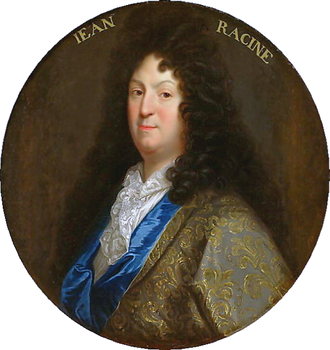 |
Racine Study GuideRacineJean-Baptiste Racine (22 December 1639 – 21 April 1699) was a French dramatist, one of the three great playwrights of 17th-century France, along with Molière and Corneille as well as an important literary figure in the Western tradition. Racine was primarily a tragedian, producing such "examples of neoclassical perfection" as Phèdre, Andromaque, and Athalie. He did write one comedy, Les Plaideurs, and a muted tragedy, Esther for the young. Racine's plays displayed his mastery of the dodecasyllabic (12 syllable) French alexandrine. His writing is renowned for its elegance, purity, speed, and fury, and for what American poet Robert Lowell described as a "diamond-edge", and the "glory of its hard, electric rage". Racine's dramaturgy is marked by his psychological insight, the prevailing passion of his characters, and the nakedness[clarification needed] of both plot and stage. ——Wikipedia Bérénice (1670)Because Titus' father, Vespasian, has died, everyone assumes that Titus will now be free to marry his beloved Bérénice, the queen of Palestine. Madly in love with Bérénice, Antiochus plans to flee Rome rather than face her marriage with his friend Titus. However, Titus has been listening to public opinion about the prospects of his marriage with a foreign queen, and the Romans find this match undesirable. Titus chooses his duty to Rome over his love for Bérénice and sends Antiochus to tell Bérénice the news. Knowing that Antiochus is Titus' rival, Bérénice refuses to believe Antiochus. However, Titus confirms that he will not marry her. Titus begs her to stay but she refuses both Antiochus and Titus. She and Antiochus leave Rome separately, and Titus remains behind to rule his empire. Reading Quizzes
Racine and Bérénice: reading quiz The Text
Background and SummaryAnalyse. Wayback Machine Back to the schedule page. Programs and information provided by hcexres@prismnet.com. |